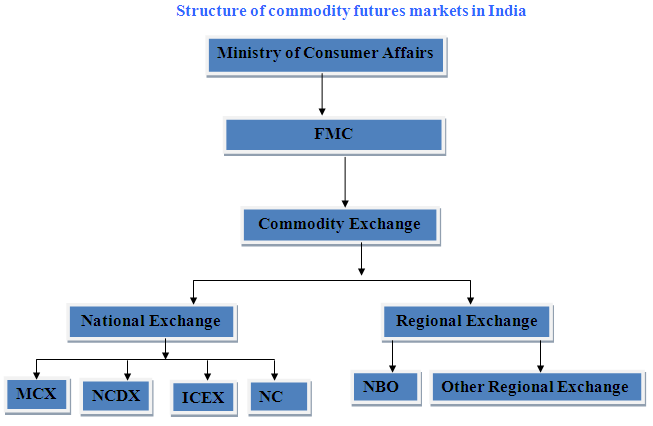The commodities market exists in two distinct forms:
- over-the-counter (OTC) market
- exchange based market
Similar to equities, there exists the spot and the derivatives segments. Spot markets are essentially OTC markets and participation is restricted to people who are involved with that commodity, such as the farmer, processor, wholesaler, etc.
A majority of the derivatives trading takes place through the exchange-based markets with standardized contracts, settlements, etc. The exchange-based markets are essentially derivative markets and are similar to equity derivatives in their working, that is, everything is standardized and a person can purchase a contract by paying only a percentage of the contract value.
A person can also go short on these exchanges. Moreover, even though there is a provision for delivery, most contracts are squared-off before expiry and are settled in cash. As a result, one can see an active participation by people who are not associated with the commodity. The typical structure of commodity futures markets in India is as follows
Ministry of Consumer Affairs, Food, and Public Distribution
The Department pertaining to consumer affairs is responsible for the formulation of policies for:
- Monitoring Prices
- Consumer Movement in the country
- Controlling of statutory bodies (Bureau of Indian Standards (BIS) and Weights and Measures)
- Internal Trade
- Inter-State Trade- The Spirituous Preparations (Inter-State Trade and Commerce) Control Act, 1955 (39 of 1955).
- Control of Futures Trading- the Forward Contracts (Regulations) Act, 1952 (74 of 1952)
The Department for food and public distribution is responsible for the formulation of policies for:
- Ensuring food security for the country through timely and efficient procurement and distribution of food grains.
- Building up and maintenance of food stocks, their storage, movement and delivery to the distributing agencies and monitoring of production, stock and price levels of food grains.
- Incentivizing farmers through fair value of their produce by way of Minimum Support Price mechanism, distribution of food grains to Below Poverty Line (BPL) families.
- Covering poor households at the risk of hunger under Antyodaya Anna Yojna (AAY).
- Establishing grain banks in food scarce areas and involvement of Panchayati Raj Institutions in Public Distribution System (PDS).
- Concerns for the sugar sector such as fixing of Fair and Remunerative Price (FRP) of sugarcane payable by Sugar factories, development and regulation of sugar industry (including training in sugar technology), fixation of levy price of sugar and its supply for PDS and regulation of supply of free sale sugar.
- Export and import of food grains, sugar and edible oils.
Forward Market Commission
The Commission functions under the control of the Ministry of Consumer Affairs, Food & Public Distribution, Department of Consumer Affairs, Government of India. The functions of the Forward Markets Commission are:
- To advise the Central Government in respect of the recognition or the withdrawal of recognition from any association or in respect of any other matter arising out of the administration of the Forward Contracts (Regulation) Act 1952.
- To keep forward markets under observation and to take such action in relation to them, as it may consider necessary, in exercise of the powers assigned to it by or under the Act.
- To collect and whenever the Commission thinks it necessary, to publish information regarding the trading conditions in respect of goods to which any of the provisions of the Act is made applicable, including information regarding supply, demand and prices, and to submit to the Central Government, periodical reports on the working of forward markets relating to such goods.
- To make recommendations generally with a view to improving the organization and working of forward markets.
- To undertake the inspection of the accounts and other documents of any recognized association or registered association or any member of such association whenever it considers it necessary.




